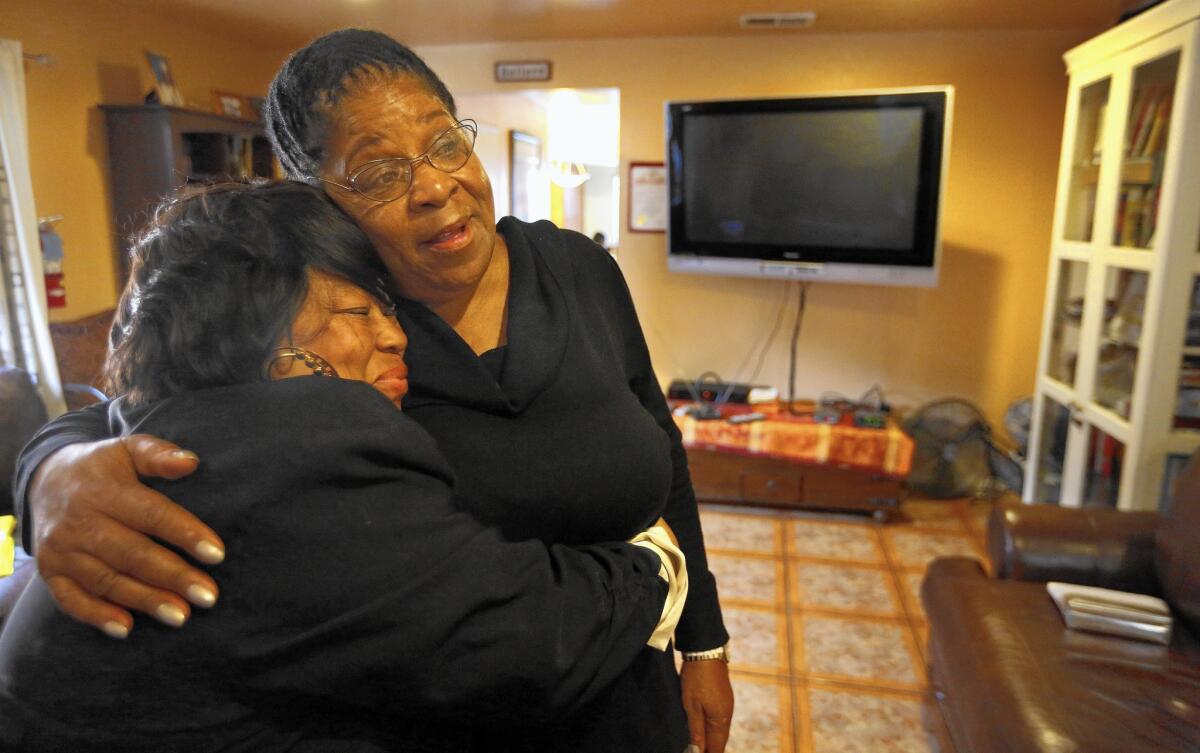Under Prop. 47, former felons find themselves shedding a stifling label

Susan Burton knows what the first day out of jail can feel like.
So after she got sober in the late ‘90s, she started spending time at a spot downtown where buses dumped women just released from custody. If they had no place to go, she invited them to come stay on a bunk bed in her bungalow in South L.A. Her hospitality grew into a reentry program with five homes that helps women reunite with their children after their release.
But her career path kept hitting the same roadblock: her own felony drug record.
Five years ago, she drove to a prison in Chino to speak to women in the cosmetology school there about how to get plugged into a community after their release. But when she arrived, she learned she’d been denied access. She felt crushed. Then mad.
“It’s crazy,” she said, her voice dropping to a hiss of a whisper. “What do I do to redeem myself? What else could I possibly do?”
An answer came in November, when voters passed Proposition 47, an initiative that reduced drug possession and several other nonviolent felonies to misdemeanors. The ballot measure — one of the biggest criminal justice changes in decades — has prompted the release of more than 3,700 inmates from state prison.
Opponents of the measure said it would make California’s streets more dangerous by releasing criminals and would strip away much of the incentive that got people into drug treatment — keeping a felony off their record. But another part of the law that drew less attention allows people who have already served their time to ask a court to reduce years-old convictions from felonies to misdemeanors.
Thousands of people, like Burton, have taken advantage. Since the measure passed, judges in Los Angeles County have received more than 6,660 applications to reduce old felonies to misdemeanors. Los Angeles County estimates that as many as 300,000 applications could be filed in cases stretching back decades. (A spokeswoman for the court said officials are not tracking the outcomes of the applications.)
Alhambra Police Chief Mark Yokoyama, president of the California Peace Officers’ Assn., which lobbied against the measure, said he’s not opposed to people with an old felony or two getting reductions if they’ve turned their lives around.
He likes that they have that option, he said, but he thinks only a small sliver of the population with felony records falls into that category.
Christine Ward, executive director of Crime Victims Action Alliance, another opponent of the law, said reducing old felonies undermines accountability for offenders.
“In our state right now,” she said, “we’re really minimizing criminal behavior.”
But others say the law helps people who are now law-abiding eliminate the barriers of a felony record.
For Burton, being labeled a felon affected how she did her job. For others, it held them back from getting work or housing. Some say it prevented them from getting custody of their grandchildren. And many agreed the stigma of a “felon” label felt stifling.
While people won’t have their rights to use or own a gun restored, reduced crimes will otherwise be treated as misdemeanors. That means people could run for office or serve on a jury. Those with eligible felonies have until November 2017 to ask a court for a reduction.
From a back office in the Compton courthouse, Deputy Public Defender Carole Telfer runs a one-stop shop for people looking to reduce their felonies under the ballot measure. Light pink memo notes — all scribbled with phone numbers and nearly identical “Call re: Prop 47” messages — explode from a green shoe box on her desk. Nearby, there’s a brown accordion folder filled with prisoners’ handwritten letters.
A man who had a felony drug possession case reduced wrote to Telfer in April before he was released from custody.
“I will call you and say thank you once I’m released,” he said. “For the first time in a long time, you made me feel like I matter, so again, thank you.”
Even people who aren’t eligible for early release under Prop. 47 are grateful, Telfer said, calling it one of the most rewarding assignments in her 35-year career as a public defender.
After the measure passed, Telfer began with the cases of people still behind bars on charges eligible for reduction. But it was often people with decades-old convictions, like Burton, who were most anxious to get through the process. They often call to tell her how eager they are to put the felonies — crimes committed by someone who no longer felt like them — behind.
“It’s amazing the ripple effect this has had,” Telfer said. “So many people went to prison for so long on drug possession cases.”
That was the case for Burton, who fell into a cocaine addiction after her 5-year-old son was run over in 1982. Grief felt so foreign. She had never lost anybody before and didn’t know how to talk about her son or whether anyone would listen if she could figure out how. Cocaine numbed the pain, but it also triggered a pattern of incarceration that followed her for nearly 20 years.
After one release, a guard wished her a calloused farewell: “I’ll see you back in a little while.”
Eventually, she checked into drug treatment in Santa Monica and started seeing a therapist every week. She got sober and vowed to dedicate her life to helping other women break the cycle of incarceration. But even as she gathered accolades — she was dubbed a “hero” by CNN in 2010 — she felt held back by her felonies.
“Being able to reduce the felony to the misdemeanor,” she said, “it really takes this burden off you that you carry all the time.”
Gerardo Reyes, a longtime meth addict who recently got sober and had three drug felonies reduced, said the new measure lifted a veil of anxiety that had shrouded his life.
As a dishwasher studying to become an electrician, Reyes said the new law has given him a burst of energy. He no longer lies anxiously in bed every morning, trying to push away imaginary scenarios in which no matter how hard he worked or studied, an employer would skip over him for an electrician job because of his felony record.
“It’s like I was born again,” he said. “Right now, the way I feel is like…’Here, go start.’”
For others, the chance to reduce some of their felonies feels like a way to shed the skin of a former self.
That’s the case for Renee Wyatt, whose heroin addiction began at 13 in her home, where she remembers finding syringes her mom had used to inject the drug in the bathroom.
She left home before long and lived on skid row for years, racking up arrests on drug possession as well as misdemeanor prostitution and theft charges. In 1993, she tried to steal a yellow comforter from J.J. Newberry’s department store in downtown L.A. and hit, scratched and kicked security guards who tried to stop her on the way out the store.
She went in and out of jail and prison so many times they blur together. But one memory from her time at the county’s old women’s jail is clear.
A few days before Christmas in 1995, word spread through her dorm that someone had smuggled in crack cocaine. Wyatt collected money from a few women and set out to find the drugs. She brokered a deal in the cafeteria and came back with the crack. The women divvied it up and she kept a bit as a holiday present to herself.
On Christmas Day, she went to the showers, pulled back the curtain and got out a match, ready to light up. Then, in a dream-like state, she saw a version of herself — 95 pounds, hair matted and full of desperation — staring back at her. She cried out to God for help.
She still took a few puffs that day, but says she has been sober since Dec. 26, 1995.
After she got out, her plan to get an associate’s degree snowballed into a love for learning. She eventually earned a bachelor’s degree, and now she’s working on her master’s in social work at Cal State Dominguez Hills. She said she wants to help people see that they don’t have to be defined by their past.
“Most people, when they found out that I’ve been to prison, it’s over … I’m a statistic,” she said, shrugging. “This is crazy. I’m not that person anymore.”
Her record has haunted her, she said, saying the Department of Children and Family Services recently denied her application to get custody of her granddaughter, who is in foster care, because of one of her felony theft convictions. She also knows that the state’s Board of Behavioral Sciences will consider her criminal record when deciding whether to license her as a social worker. She met with an attorney a few months ago and knows several of her drug possession charges are eligible for a reduction.
On a recent afternoon, she propped her feet up on the coffee table in her living room above a copy of “Psychology Today” magazine, and daydreamed about her future. Her eyes widened and she ran into her room, returning with a black “vision board” she’d decorated three years earlier with things she hoped to accomplish.
In colorful letters, it read “MSW,” short for master’s in social work. She also cut and pasted phrases from magazines — one reads “Dream, plan, go,” another “Leap of faith.” A picture of a building labeled “Wyatt Transition House for Women,” represents her long-term goal of opening a reentry home.
As her eyes panned to the right, they froze on a picture of an ocean seascape labeled “Caribbean.” She let out a high-pitched scream and her eyes welled with tears. She had forgotten about the board when she and a classmate recently reserved a hotel in Jamaica as part of a graduation trip.
“It comes true,” she said, singing the last word.
She closed her eyes and prayed out loud: “Thank you, Lord. That’s amazing. What a life.”
More to Read
Start your day right
Sign up for Essential California for news, features and recommendations from the L.A. Times and beyond in your inbox six days a week.
You may occasionally receive promotional content from the Los Angeles Times.






